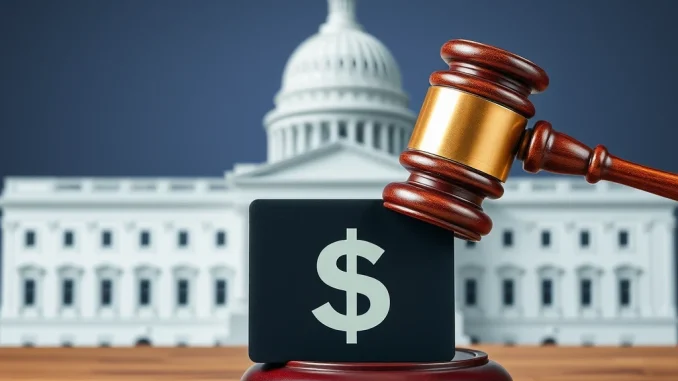
Is your financial privacy at risk? The landscape of digital currency in the United States is undergoing a seismic shift. In a move that has sent ripples through the financial world, the U.S. House Financial Services Committee has just approved the Anti-CBDC Surveillance State Act. This pivotal decision could dramatically alter the future of how digital currency operates in America and, crucially, impact your personal financial freedom. Let’s delve into what this anti-CBDC bill means for you and the future of money.
What is the Anti-CBDC Bill and Why is it Important?
The Anti-CBDC Surveillance State Act (H.R. 1919), championed by House Majority Whip Tom Emmer, is not just another piece of legislation; it’s a bold statement against the potential overreach of government into personal finance. In a 27-22 vote, the House Financial Services Committee gave it the green light, signaling a significant step towards restricting the Federal Reserve’s ability to issue a central bank digital currency (CBDC) directly to individuals. But why all the fuss about a digital currency issued by the Fed?
Here’s a breakdown of the key concerns driving this bill:
- Privacy Fears: At the heart of the opposition to a Fed-issued CBDC is the specter of government surveillance. Critics worry that a central bank digital currency could become a tool for monitoring citizens’ financial transactions, eroding personal privacy.
- Control and Centralization: The bill’s proponents argue that a CBDC would concentrate too much power within the Federal Reserve and the government, potentially leading to a ‘surveillance state’ where financial activities are constantly tracked.
- Financial Freedom: There’s a strong belief that individuals should have the freedom to choose their financial instruments without undue government influence. The anti-CBDC bill is seen as a defense of this fundamental financial freedom.
The Core Objectives of the Anti-CBDC Bill
So, what exactly does this anti-CBDC bill aim to achieve? It’s more than just a simple ‘no’ to digital currency. It’s a strategic move to shape the future of finance in the U.S. Here are the primary goals:
| Objective | Description |
|---|---|
| Block Fed-Issued CBDC | The bill directly prohibits the Federal Reserve from issuing a central bank digital currency. |
| Restrict Direct-to-Consumer CBDC | It prevents the Fed from offering a CBDC directly to individuals, ensuring that any digital dollar would likely need to operate through existing financial institutions, if allowed at all. |
| Safeguard Financial Privacy | A key underlying goal is to protect citizens from potential government surveillance and maintain financial privacy in the digital age. |
Why is the Federal Reserve Considering a Digital Currency?
With all this resistance, you might wonder, why is the Federal Reserve even exploring a digital currency in the first place? Central banks worldwide are examining CBDCs for various reasons, including:
- Modernizing Payment Systems: To keep pace with the rapidly evolving digital economy and offer faster, more efficient payment solutions.
- Financial Inclusion: To potentially bring more unbanked and underbanked populations into the formal financial system.
- Maintaining Monetary Sovereignty: In a world increasingly influenced by private cryptocurrencies and other digital assets, CBDCs are seen as a way for central banks to maintain control over monetary policy.
- Competition and Innovation: To foster innovation in the payment space and maintain competitiveness in the global financial landscape.
What are the Potential Benefits of a CBDC?
Despite the concerns, proponents of a digital currency from the Federal Reserve highlight several potential advantages:
- Faster and Cheaper Payments: CBDCs could streamline transactions, potentially reducing costs and speeding up payment processing.
- Enhanced Security: Backed by the central bank, a CBDC could offer a more secure and stable form of digital money compared to some private cryptocurrencies.
- Improved Monetary Policy Implementation: A CBDC could provide the Federal Reserve with new tools for implementing monetary policy and responding to economic crises.
- Reduced Illicit Activities: Theoretically, a well-designed CBDC could offer greater transparency and traceability, potentially helping to combat money laundering and other illicit financial activities.
The Road Ahead for Digital Currency and the Anti-CBDC Bill
The passage of the anti-CBDC bill by the House Financial Services Committee is a significant milestone, but it’s not the final word. The bill still needs to go through further stages in the House and Senate, and it could face revisions or even be blocked along the way. The debate surrounding a digital currency in the U.S. is far from over.
Key Takeaways and Actionable Insights:
- Stay Informed: The discussion around CBDCs and digital currency is evolving rapidly. Keep yourself updated on the latest developments.
- Engage with Representatives: If you have strong opinions on CBDCs, consider contacting your elected officials to voice your concerns or support.
- Understand the Implications: Whether you’re for or against CBDCs, take the time to understand the potential implications for your financial privacy and the broader economy.
Conclusion: A Pivotal Moment for Financial Freedom
The U.S. House panel’s approval of the anti-CBDC bill marks a pivotal moment in the ongoing debate about the future of money. It underscores the deep-seated concerns about government surveillance and the desire to protect financial freedom in the digital age. As this legislation moves forward, it will be crucial to continue the conversation, weigh the potential benefits and risks of digital currency, and ensure that any future financial system serves the best interests of individuals and society as a whole. The fight for financial privacy and control is far from over, and this anti-CBDC bill is a significant battle won in that larger war.



